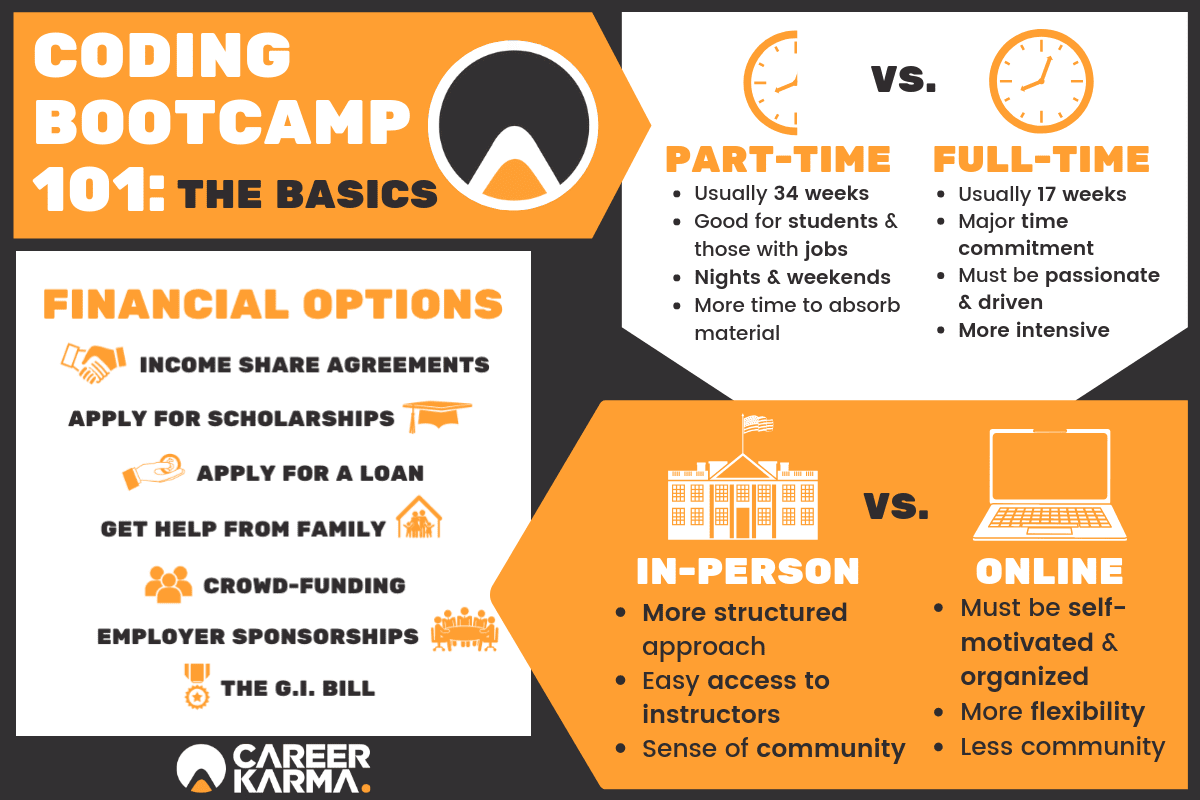Curriculum and Skill Acquisition

Coding bootcamps and traditional computer science (CS) programs differ significantly in their approach to curriculum design, prioritizing either breadth or depth of knowledge. Bootcamps generally favor a focused, intensive curriculum emphasizing practical skills immediately applicable to entry-level roles, while CS programs provide a broader, more theoretical foundation, preparing students for a wider range of career paths and advanced studies. This difference shapes the types of skills acquired and the kinds of projects undertaken.
Bootcamps and CS programs offer distinct skill sets. While both aim to develop programming proficiency, their emphasis varies. Bootcamps typically prioritize practical skills needed for immediate employment, such as proficiency in specific programming languages (e.g., JavaScript, Python, React), frameworks (e.g., Node.js, Angular), and databases (e.g., SQL, MongoDB). They often include training in agile development methodologies, version control (Git), and testing practices. In contrast, CS programs delve deeper into theoretical computer science concepts like algorithms, data structures, and discrete mathematics. They also cover a broader range of programming paradigms, potentially including functional programming, and often incorporate advanced topics such as operating systems, computer networks, and artificial intelligence.
Skill Emphasis Comparison
Bootcamps tend to focus on in-demand, immediately applicable skills within a specific domain, such as web development or data science. This allows graduates to quickly enter the workforce. CS programs, however, provide a more comprehensive understanding of underlying principles, enabling graduates to adapt to evolving technologies and pursue more advanced roles. For example, a bootcamp might focus heavily on building responsive websites using React, while a CS program would explore the theoretical underpinnings of user interface design, alongside broader software engineering principles and various programming languages.
Project Examples
The types of projects undertaken reflect the curriculum differences.
Are coding bootcamps a shortcut – The following illustrates the differences in project scope and complexity:
- Bootcamp Projects: Building a full-stack web application (e.g., an e-commerce site or a social media platform) using a specific technology stack; creating a data visualization dashboard using a chosen library (e.g., D3.js, Tableau); developing a mobile application using a framework like React Native or Flutter.
- University Projects: Designing and implementing a custom operating system kernel; developing a compiler for a simplified programming language; creating a distributed system for managing large datasets; researching and implementing a novel algorithm for a specific problem.
Practical Application of Skills, Are coding bootcamps a shortcut
Bootcamp graduates often find immediate employment in entry-level developer positions, leveraging their practical skills to contribute to real-world projects. Their training emphasizes rapid development and deployment, making them valuable assets in agile environments. CS graduates, with their broader theoretical foundation, might initially seek roles requiring deeper technical expertise or pursue more advanced roles after gaining experience. They may be better equipped for research-oriented roles or positions requiring advanced problem-solving skills. For example, a bootcamp graduate might quickly build a functional web application for a startup, while a CS graduate might design a more scalable and robust system for a larger company.
The Role of Networking and Mentorship: Are Coding Bootcamps A Shortcut

Coding bootcamps and traditional university programs both offer pathways to a career in tech, but the methods of acquiring professional connections and guidance differ significantly. Strong networks and supportive mentorship are crucial for navigating the complexities of the tech industry and achieving career success, regardless of the educational route chosen. This section will explore the networking and mentorship opportunities presented by each, highlighting their unique advantages and disadvantages.
Networking opportunities within coding bootcamps are often intentionally cultivated. The immersive, intensive nature of these programs fosters a strong sense of community among students, creating a natural environment for collaboration and the formation of professional relationships.
Bootcamp Networking Opportunities
Bootcamps frequently organize networking events, workshops, and career fairs specifically designed to connect students with potential employers. These events provide opportunities to build relationships with instructors, alumni, and industry professionals. Many bootcamps also maintain active alumni networks, offering ongoing support and connection opportunities even after graduation. The concentrated timeframe of a bootcamp often leads to the development of close bonds between cohort members, creating a lasting professional network. This tightly knit community can be a significant asset in finding job opportunities and navigating the early stages of a tech career. Furthermore, the intense collaborative projects often undertaken within bootcamps naturally lead to the formation of professional relationships that extend beyond the program’s duration.
Mentorship in the Coding Field
Mentorship plays a vital role in the success of coders at all levels, regardless of their educational background. A mentor can provide guidance on career paths, technical skills, and professional development. They can offer valuable insights into industry trends, company culture, and interview strategies. A mentor’s experience can help a mentee avoid common pitfalls and accelerate their professional growth. Mentorship is particularly valuable for navigating the ever-evolving landscape of technology, where staying current with new tools and techniques is crucial. This support system extends beyond technical expertise; mentors can offer crucial advice on work-life balance, stress management, and overall career satisfaction.
University Program Networking Opportunities
University programs, particularly those with strong computer science departments, also offer significant networking opportunities. These often include larger-scale career fairs, industry guest lectures, and opportunities to participate in research projects alongside professors and graduate students. University networks tend to be broader and more geographically dispersed, encompassing alumni across various sectors and locations. However, the less intense and more spread-out nature of university education may mean that the formation of close-knit professional relationships takes longer to develop. The larger student body can also make it more challenging to build strong personal connections with professors and industry professionals.
Scenario: Mentorship and Career Advancement
Imagine Sarah, a recent coding bootcamp graduate, struggling to secure her first developer role. She’s technically skilled but lacks confidence in interviews and isn’t sure how to effectively network. Through her bootcamp’s alumni network, she connects with a senior software engineer, Mark, who becomes her mentor. Mark helps Sarah refine her resume and practice her interviewing skills, providing constructive feedback and valuable insights into the job search process. He also introduces her to contacts at his company, leading to an interview and ultimately a job offer. Without Mark’s mentorship, Sarah’s job search might have been significantly longer and more challenging. This scenario highlights how mentorship can be a crucial catalyst for career advancement, offering invaluable guidance and support beyond the technical skills acquired through education.


Tim Redaksi